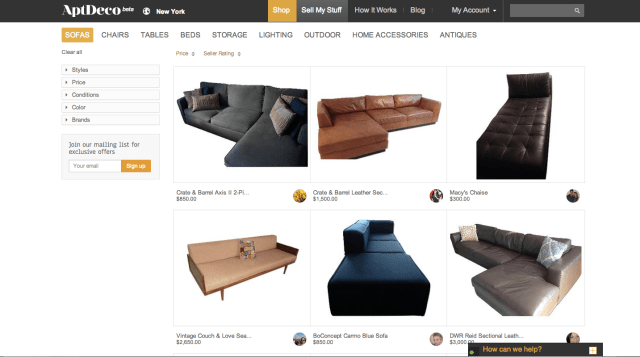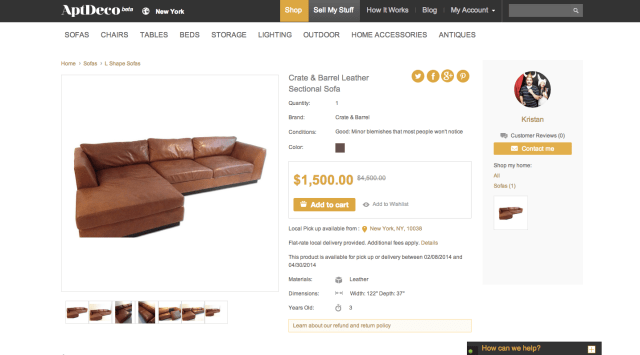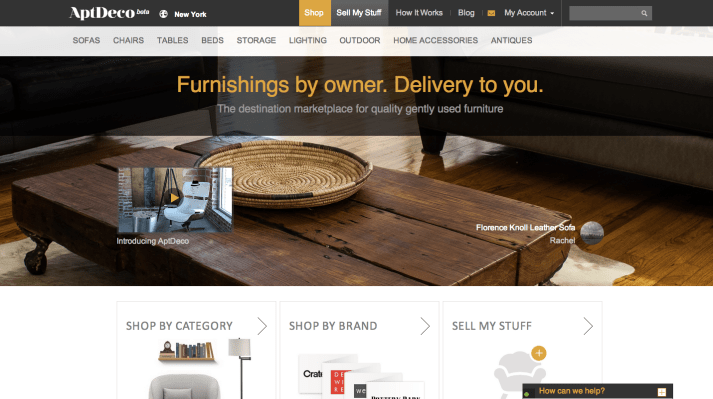Moving sucks. Especially if you have to jettison a load of furniture the next time you swap states or switch apartments. AptDeco, just graduating from YC, is aiming to fix that — via its p2p secondhand furniture marketplace which bolts on a fully insured delivery service so buyers don’t have to worry about the logistics of hiring a truck themselves, or finding a company to do the pick-up for them.
Taking care of delivery also means sellers can get to sell their couch or bed without having to expose themselves to the risk and inconvenience of random strangers coming inside their home to check the furniture out and carry it away. And of course AptDeco takes care of the payment, with transactions processed via its website, so there’s no cash changing hands at the pick up point, and no risk of any last minute haggling over the price-tag.
Buyers browse AptDeco’s website, where curated seller listings are displayed, and submit a purchase request to buy an item. Once the seller confirms a sale, the buyer’s credit card is authorized, and the card is charged when the item is delivered. AptDeco’s business model involves taking a cut of the item’s selling price — which it says is less than the cut taken by rival furniture marketplaces such as Chairish and Viyet.
AptDeco is able to keep its overheads low (so it can take a smaller fee off sellers) by not holding any stock itself. Unlike rivals which store secondhand furniture themselves so have to operate warehouses, it’s a fully p2p marketplace. AptDeco takes a cut of between 14% and 19% of an item’s final sale price — just below the Chairish fee of 20%. And unlike Chairish it does not have a minimum selling price for items.
AptDeco is currently operating in the New York Tri-State area — although it tells TechCrunch it plans to expand to other areas of the U.S. this year — focused on the kind of dense and affluent urban area where people are frequently swapping apartments. Co-founders Kalam Dennis and Reham Fagiri say their service is generally targeting circa 25 to early 40s working professionals “who care about design and aesthetics”.
“In the U.S., people move a lot,” says Fagiri. “The average person moves nine times after the age of 18 — so that’s a lot of moves, and whether they’re moving to a bigger place they’re going to need to buy furniture or update their furniture, or they’re consolidating and moving to a smaller space, getting married… they’re going to have to get rid of furniture, so there’s a need for this. Especially now [in the sharing economy age] — people are just more comfortable sharing their possessions with other folks.”
Overall, the secondhand furniture market is a billion dollar marketplace in the U.S. alone, says Dennis. Centralised U.S. cities he name checks for future possible AptDeco rollouts include Boston, Philadelphia, San Francisco and DC — but it’s also thinking outside the States too. “There’s 20 cities in the U.S. that we think can benefit, and also internationally it’s obviously a big opportunity as well,” he adds.
For its current operational footprint, AptDeco has partnered with New York’s Dumbo Moving and Storage for the delivery service — which costs buyers a flat fee of $65 within New York’s five boroughs, and an average of $120 for the Tri-State area. Buyers can still opt to pick an item up themselves if they don’t want to pay the delivery fee. And sellers can offer to split delivery costs with buyers, if they choose. Item delivery can be as soon as 48 hours after the seller confirms with their schedule.
Despite not having a minimum item price, AptDeco says it is focusing on ensuring quality items of furniture are listed for sale on its marketplace. The marketplace itself is curated — with a look and feel that’s deliberately designed to resemble an ecommerce website — with every listing going through a review and checking process to ensure it has enough information and that the item itself fits with the marketplace’s look and feel.

Some less aesthetic categories of items aren’t allowed at all — mattresses, for instance, and no electronics either (so you can’t flog your room-sized flat-panel TV). And not all secondhand furniture will make the cut, either.
“We try to hold items to a particular quality standard — so it’s not a particular brand. We have items that are from Ikea, or from any other place, but it’s more just about is it a quality piece of furniture,” says Dennis, adding with a laugh: “We just don’t want to have crappy stuff.”
“Part of it is also making sure that our listings are held to a certain standard. So the way we set up our site is actually that it looks and feels like an ecommerce site but it is a marketplace,” adds Fagiri. “So if you’re shopping at another furniture store website you’ll have dimensions, you’ll have very specific requirements and information that you need to purchase furniture so we’re upholding our sellers to the same standard. And this is helping with the buying process, from the other side.”
While ratings systems work well and can be essential for other p2p services, such as Airbnb where a host is always going to have the same apartment to rent out, getting people to rate a couch seller isn’t such a worthwhile exchange, as they may never sell another stick of furniture (and certainly won’t be selling the same couch again) — so although AptDeco’s site does include ratings the pair say that feature is not much used.
Their focus is therefore on helping sellers make the best listings they can — working with them to flesh out listings when there isn’t enough information included in the initial submission, for instance, or getting them to improve the photography before the listing finally goes live.
The startup also offer buyers a verification service where its own staff will go out and check a piece of furniture really is what the seller says it is, brand and condition wise.

AptDeco soft launched its website back in May 2013 and it says growth has been ramping up. “We’re growing quite rapidly,” says Fagiri. “It’s actually been tremendous growth, especially after we started YC. The first six months of our service it’s been mostly word of mouth, really, really small marketing — without a marketing budget. It was really exciting, actually, the day we launched we had a sale. And since then it’s been growing quite exceptionally.”
The week-by-week growth rate it’s seeing now is around 30%, while the AptDeco website is getting between 1,300-1,400 unique visits per day.
What has the YC process contributed to the business’ development? “They teach you how to be physical,” says Dennis — so, in other words, not to just set up a technology process and, once it’s started working, walk away.
“It’s about getting your hands dirty,” adds Fagiri. “When we built our site and our system, it’s fully automated; we don’t have to even do any hand-holding — you can go places on our site and order automatically and it gets sent to our moving company, they book it in their system, then they show up. We actually don’t need to be part of the system or the process but what we’ve learned through YC… is in the beginning it’s important to be a part of every single part of the process.
“It’s time-consuming, sure, but it does make a difference — it makes a difference because we understand now what’s needed and what’s not needed, and what we can optimize for.”
Priorities for AptDeco from here on in are getting the word out about its service, and maintaining high quality levels of customer service. Currently most of the curation, listing review and customer service work is being done by Dennis and Fagiri themselves — and of course that’s not going to scale.
“I was reading a document from one of the VC firms that worked with YC, and the one thing that really resonated was pre-emptively building for the future. Pre-emptively,” stresses Dennis, discussing the startup’s priorities for the rest of the year. “If there’s anywhere where we need to build pre-emptively it’s going to be from a customer service standpoint.
“Those are the measures that we’re literally putting in place right now. As soon as we get off the phone right now we’re going to be interviewing a couple of people from a customer service standpoint. So that is something that really rang through.”
